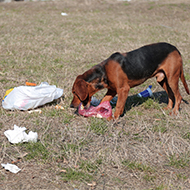Dogs are the most likely victims of litter.
BVA warns animals may 'pay the price' for outdoor socialising.
The British Veterinary Association (BVA) is reminding the public to dispose of rubbish responsibly as lockdown eases to avoid harm to farm animals, pets and wildlife.
With many people planning picnics and BBQs with their loved ones in the weeks ahead, the organisation is asking the public to remain mindful of the dangers litter and food packaging can pose to animals.
It comes after figures from the BVA’s Voice of the Veterinary Profession survey revealed that 44 per cent of vets in 2018 treated animals suffering from harm from litter.
The survey found that dogs are the most likely victims of litter, with 41 per cent of companion animal vets reporting they have seen litter-related injuries in dogs. However, there were also reports of cases in wildlife and livestock.
Of those vets who provided examples of litter injuries, nearly half (47%) reported animals that had been harmed by glass, tin or metal cans. Twenty-three per cent reported animals tangled up in materials such as elastic bands, netting, wire and plastic rings, and 18 per cent reported injury from fishing equipment.
BVA senior vice president Daniella Dos Santos said: “We are all looking forward to reuniting with loved ones in accordance with government guidance over the next month, and for many of us, this will mean socialising outside in parks, gardens and other outdoor spaces. We are hoping that this reminder of the harmful impact litter can have on animals prompts everyone to ensure they dispose of any waste responsibly.
“These figures show that even before the current restrictions, many animals were arriving in practices across the country every week requiring treatment for terrible, and sometimes fatal, injuries and poisoning caused by discarded rubbish. This isn’t just about obvious hazards like broken glass; any unsecured rubbish in public spaces, or even outside your home, can attract animals and lead to injuries.”
BVA’s Voice of the Veterinary Profession survey also revealed that more than a third of vets reported harm from eating food waste, such as rotting food, bones, fruit stones and corn cobs. Around a third of the vets (31%) reported examples of harm from ingestion of non-food waste such as plastic or food packaging.
Pet owners are encouraged to seek veterinary care as soon as possible if they believe their animal may have eaten or been injured by litter. People who find injured wildlife should contact a specialist wildlife centre in their area or their local vet if none are available.





.jpg)

 The latest
The latest 
